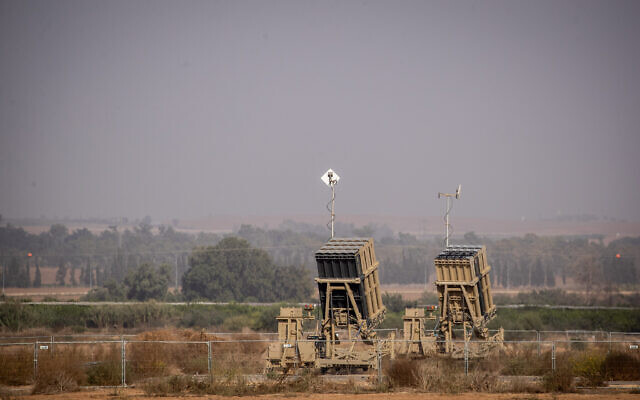Gaza ceasefire between Israel, Islamic Jihad said in effect from 5:30 a.m.

Egypt has brokered a ceasefire between Israel and the Islamic Jihad terror group to end two days of intense fighting in Gaza that saw hundreds of rockets fired into Israel and 32 Palestinians killed in Israeli strikes, Palestinian and Egyptian officials said early Thursday.
The truce went into effect at 5:30 a.m after three hours of tense calm following an Israeli strike that the IDF said killed Rasmi Abu Malhous, a terrorist said to head Palestinian Islamic Jihad’s rocket unit. The strike, which targeted a house in Deir al-Balah, reportedly claimed the lives of an additional five members of the same family. The Hamas-run Gaza Health Ministry said the dead included a woman and a child and all were civilians.
The “ceasefire agreement comes as a result of Egypt’s efforts” and has been endorsed by “Palestinian factions including Islamic Jihad,” said a top Egyptian official.
Islamic Jihad spokesman Musab al-Berim said the ceasefire was based on a list of demands presented by his group late Wednesday, including a halt to Israeli targeted killings of the group’s leaders.
Israel Radio quoted a senior Egyptian official as saying that Islamic Jihad had agreed to stop firing rockets and will ensure protests along the Gaza border are peaceful.
Israel agreed to end airstrikes and targeted killings and committed to stop shooting protesters along the fence, the report said.
Israel has not confirmed the ceasefire, but has in the past often refrained from confirming truces with Gaza terror groups to preserve the impression that it does not negotiate with terror groups.
Less than an hour after the truce went into effect rocket sirens sounded in Israeli communities just north of Gaza. The IDF said it was investigating the incident.
The truce came after a night of violence.
After midnight Palestinians continued to fire rockets into Israel until 2:30 a.m, with salvos fired at southern Israeli cities and communities along the Gaza border. Iron Dome intercepted several of the rockets and there were no reports of Israeli casualties.
The latest fighting began after Israel killed Baha Abu al-Ata, a senior commander in the terror group’s military wing, in a predawn Tuesday airstrike. Israeli officials say Abu al-Ata was preparing multiple terror attacks against Israelis.
In response, the group launched at least 360 rockets at Israeli cities, according to a Wednesday night count by Israeli officials. The IDF responded to the fire with waves of airstrikes targeting the terror group’s installations and rocket-launching squads.
The terms of the reported ceasefire were similar to conditions laid out by Islamic Jihad’s Damascus-based Secretary General Ziad Nakhala late Wednesday.
In a Wednesday night interview with the pro-Hezbollah Lebanese television station Al-Mayadeen — PIJ, like Hezbollah, are allied with Iran — Nakhala said the terror group had laid out ceasefire conditions during talks in Egypt, which he said Israel would have to accept to achieve a ceasefire.
“We gave specific conditions for a ceasefire. If Israel accepts them, we will accept a ceasefire,” he said. “If Israel does not accept them, we are going to continue to fight for an indefinite period of time.”
Those conditions “are simple and humble. First, We are talking about halting assassinations in the Gaza Strip and West Bank,” he said, before apparent technical trouble on Al-Mayadeen’s part made the rest of the sentence inaudible.
He continued: “Second, stopping fire on innocent civilians at the March of Return. Third, Israel abiding by the understandings that were concluded in Cairo which are related to the measures [inaudible] in the Gaza Strip.”
Nakhala was apparently interviewed from Cairo, where he landed Wednesday evening to take part in Egyptian-led talks to end the fighting.
An Israeli diplomatic official appeared to confirm Wednesday night that Israel was nearing a ceasefire agreement with the terror group, saying PIJ was beginning to understand its rocket fire had failed.
“Quiet will be answered with quiet, and what happens on the ground will be the deciding factor,” the official said.
Islamic Jihad’s military wing, the Al-Quds Brigades, claimed its rocket attacks had inflicted extensive damage on the Israeli home front.
“If the enemy reveals [what they have done], it will turn Netanyahu into a laughingstock on the Zionist street,” spokesman Abu Hamza tweeted.
Top Israeli officials have said they are not seeking continued fighting, but were prepared to do take necessary steps to stop the rocket fire.
Earlier, a Hamas official suggested it would join Islamic Jihad in firing rockets at Israel if the Israeli military continued to strike Gaza.
Israel on Wednesday threatened to carry out additional targeted killings against Gaza terror leaders, but has refrained from explicitly threatening Hamas. This position marked a departure from previous rounds of fighting, when the Jewish state maintained it held Hamas responsible for all violence emanating from the coastal territory.
On Wednesday evening, the IDF Home Front Command eased some of the restrictions that had been in place on areas farther from the Gaza Strip. Under the new instructions, people living in the central Negev and Lachish regions will be permitted to return to work, provided there is a bomb shelter close to the building. However, schools will remain closed in those areas for the third day in a row.
School will resume in the Shfela region tomorrow, and the IDF has also removed all restrictions on the number of people permitted to gather in closed areas in the Tel Aviv metropolitan area and in the Yarkon and Shfela regions. Outdoor gatherings in those areas will remain limited to 300 people.
All restrictions will remain in place for the regions closest to the Gaza Strip: Schools will remain shut Thursday; non-essential businesses will be closed; and all gatherings must be kept to fewer than 100 people.
Read more: The Times of Israel
